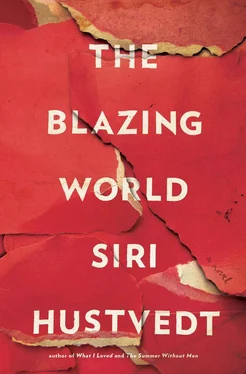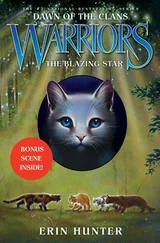Rune had shown her a video of himself with Felix Lord. It was nothing, she kept saying, nothing at all, just the two of them sitting on a sofa in a nondescript room she had never seen before, not saying a word to each other, thirty, forty seconds of silence and one smile exchanged between them. The dead husband had roared back on film. “Why didn’t you tell me you knew Felix?” Harry had asked him. And he had said, “Does it matter?”
“Does it matter, Bruno?”
You bet it does, I said. It’s sneaky as hell. I told her I’d like to take my bat and smash his brains out.
And Harry said, “This is not a cartoon, Bruno.”
So much is gone now, of our conversations, I mean. The nights we lay and burbled into the wee hours, we two, my big, warm Harry and me, my pet, my heartsease, all lost, not a word left, but This is not a cartoon, Bruno is stamped into the furrows of my brain forever. I have perfect recall for this exchange. I went mum then, mute as a man who’d lost his larynx. She made me feel like some stupid jerk in a gorilla suit, blindly swinging because he can’t see out the eyeholes.
When I asked Harry what it meant, she said she didn’t know. Rune wouldn’t say. “He said that it’s just part of the game.”
I asked, “What game? What game?” I pressed her. I pressed her hard. “Blackmail?”
Harry stared at the ceiling and shook her head. She said she thought Rune was playing mind games with her and that the bastard would do anything to win. She said he wanted to worm an idea into her brain, that he had been Lord’s lover, maybe, or that he had known all about her from Felix before they met, something, anything. Once there is a secret, Harry said, you can fill up the hole with suspicion. When he was alive, Felix had secrets. Harry set her jaw and her eyes narrowed. She didn’t look at me. “He’s going to say Beneath is his. But it’s too late,” she said. “He won’t get away with it.”
Lord’s grave was never quiet. I wanted to shake Harry, force her to end it. Now was her chance to stop the merry-go-round, to jump off. I would help her. Bruno, her hero and protector, would swoop in to save her from herself. “Let’s go away,” I said. “Let’s leave.”
Harry shook her head.
I told her I loved her. I love you to high heaven, I said. I love you. Do you hear me?
She heard me. “I love you, too,” she said. She was not thinking of me.
Bruno, high on his noble sentiments, Mr. Rescue: All I needed was a phone booth where I could change into the suit. There aren’t phone booths anymore, old man.
I remember the sun made rectangles of light on the wood floor. I remember Harry’s sad face, and I remember the words that popped up to be quoted on that palimpsest in my mind. They came from the book of Ruth, King James version, the words of a woman who trailed after another woman and refused to turn back.
Whither thou goest, I will go , I said to Harry. Where thou diest, will I die, and there will I be buried .
Harry smiled a wobbly smile. “That’s nice, Bruno,” she said.
It felt like a kick to the gut.
Oswald Case (written statement)

Rune never gave up on irony. That was his victory. Despite the general nothing-will-ever-be-the-same-again moaning and hand-wringing and great American soul-searching that went on in the aftermath of 9/11, if you ask yourself whether the art world was permanently altered by that day, the answer is an earsplitting no. After all is said and done, three thousand dead downtown ranks as a sneeze in the market, a momentary convulsion of conscience. Yes, artists whined about meaninglessness and a new beginning, but a few months later, it was life comme d’habitude . Mea culpa. I am the author of “Irony Died at Ground Zero,” published in The Gothamite the week of September 23. Let me put it this way: When I banished irony, that most necessary of all forms of thought, I meant it. Lower Manhattan was a freshly dug graveyard, and I thought I had been remade as Monsieur Sincère. Furthermore, I have since acknowledged my error. That is more than I can say for any number of my esteemed colleagues who poured their thwarted literary ambitions into cringingly bad articles. They forgot the motto of our noble profession: here today, gone tomorrow. My offering to the end-of-irony moment was not nearly as bathetic as most of the garbage that was published after 9/11. How many times did I read: “Who could have imagined it?” Every two-bit screenwriter in Hollywood had already imagined it. Rune had it right. He knew the spectacle would be used, exploited, rewritten in a thousand different and, mostly, tawdry ways.
When I interviewed him in 2002, he talked about his struggle with catastrophe as art. How could a slaughter that had already been manipulated into multiple narratives be represented? He talked about the speed of technology, about simulation, and finally, about awe. He said he’d never experienced it — awe. He hadn’t felt it before 9/11. He called it “emotional superconductivity.” He wanted it in the work. I know that Harriet Burden believed she had found a third cover for her this-woman-can-become-a-celebrity-artist-too campaign. The question is, did she intervene enough to rob Larsen of credit for the works, which would be shown a year and a half later? I think not. I think he knew exactly what he was doing. Beneath hit the art world like a tornado. The timing was brilliant. He knew that to show the images everyone saw on television on 9/11, and for a few days after, would not do, not in New York City. But if you had to walk through a maze, and look at black-and-white film footage of devastated cars or kiddy shoes covered in dust, along with that weird mask fantasy sequence (which I believe Rune directed), the viewer’s experience would increase in intensity. He used Harriet Burden as a muse. I give her credit for that, but mingling the fantasy images with others that were completely banal — Rune with a coffee cup looking out the window or snow falling — directly referenced Banality . Also, the robotic motions of the dancers are pure Rune. Beneath looks nothing like those squishy Burden works that are being shown now.
Well before my interview with him, Rune had become a bad-boy celebrity, which of course means that he was not nice. He was too complicated to be a nice guy, but then, niceness is not only overrated, it is far less attractive than it’s cracked up to be. People love a large, meaty ME. They say they don’t, but in the art world a cowardly, shrinking personality is repellent (unless it has been highly cultivated as a type), and narcissism is a magnet. The artist’s persona is part of the sell. Picasso was a genius, but look at the mythology. He ate people for breakfast. He had lots of women and loved torturing them. He was King of Confidence, a bloated, swaggering tower of talent whose scribbles on napkins are worth more than I will earn in a lifetime. If you don’t seduce people, you don’t have a chance. Look at Schnabel in his pajamas. Entitlement works.
In that first interview, Rune revealed his savvy for the ins and outs of the market. When I asked him about his last show, he said, “ The Banality of Glamour did well because collectors found it edgy. They liked the reference to Hannah Arendt, even though they’d never read her book. I’ve never read it either. But the play on glamour and evil is fun because evil is not supposed to be banal but now glamour is.” By then, Rune had recorded himself daily for years: the life of the artist as a young man about town. I shall take this opportunity to correct a tired old truism: “Beauty is skin deep.” It is not. It is life down deep. Beauty makes you. Six-three, blond, blue-eyed, and fine-featured, Rune’s northern European roots blared as loudly as the commercials on TV that run at several decibels higher than the regular shows. His eyes were pale blue. There were times when I looked at him and felt as if I were talking to one of the replicants in Blade Runner .
Читать дальше













